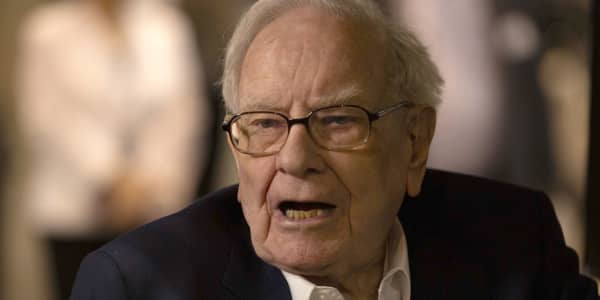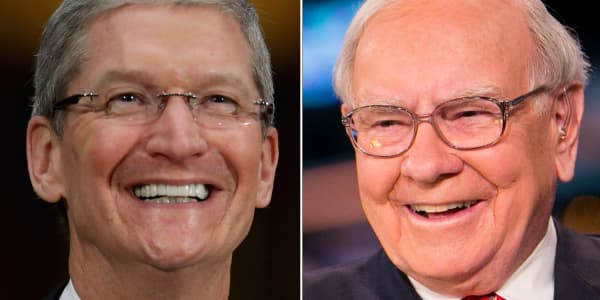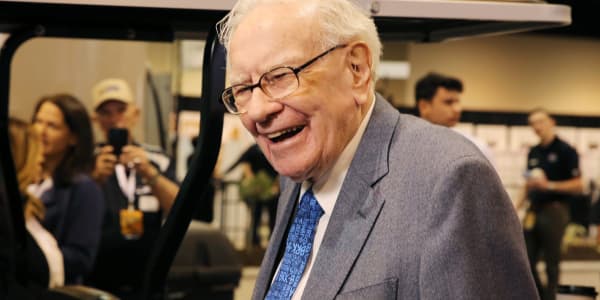Warren Buffett has a new nugget of pithy advice for investors in his new letter to Berkshire shareholders: "When it's raining gold, reach for a bucket, not a thimble."
Buffett recalls that last year's letter called corporate and municipal bonds "ridiculously cheap" compared to U.S. Treasuries. And we says Berkshire did "back" that view by making some purchases, but "I should have done far more. Big opportunities come infrequently."
Still, it's not all regrets. Buffett writes, "We've put a lot of money to work during the chaos of the last two years. It's been an ideal period for investors: A climate of fear is their best friend. Those who invest only when commentators are upbeat end up paying a heavy price for meaningless reassurance."
Berkshire ended 2009 with $30.6 billion in cash, down from $44.3 billion at the beginning of 2008. Of that roughly 30 billion, $8 billion was "earmarked" for its then-pending acquisition of Burlington Northern Santa Fe.
Buffett reports the market value of Berkshire's common stock portfolio stood at $59.0 billion at the end of 2009. That's a gain of just over 70 percent from the $34.6 billion purchase price of those securities.
Berkshire also has positions in non-traded securities of Dow Chemical, General Electric (CNBC's parent company), Goldman Sachs, Swiss Re, and Wrigley. All were bought in the last 18 months. Carrying value: $26.0 billion vs. an aggregate cost of $21.1 billion. Buffett says they generate a total of $2.1 billion a year in dividends and interest, while also providing a "significant equity potential."
Buffett notes that Berkshire's largest sales in 2009, ConocoPhillips, Moody's, Procter & Gamble, and Johnson & Johnson, helped pay for the Dow, Swiss Re, and BNSF purchases.
Those sales were not motivated by a belief the stocks would fall in price. "Charlie (Munger) and I believe that all of these stocks will likely trade higher in the future."
"A PAINFUL CONFESSION"
In his letter, Buffett admits to what he calls "a very expensive business fiasco entirely of his own making."
Thinking that GEICO policyholders would be good credit risks, Buffett "unfortunately" came up with the "brilliant insight" that the insurance company should market its own credit card.
Buffett writes:
GEICO’s managers, it should be emphasized, were never enthusiastic about my idea. They warned me that instead of getting the cream of GEICO’s customers we would get the – – – – – well, let’s call it the non-cream. I subtly indicated that I was older and wiser. I was just older.
Total losses: $50.3 million. Almost $100 million of troubled receivables were sold for 55 cents on the dollar.
BERKSHIRE'S STRONG 2009 UNDERPERFORMS STOCK MARKET
Berkshire Hathaway had a strong 2009, but not strong enough to outperform the benchmark S&P 500 stock index.
In his letter, Buffett reports the company's net worth increased by $21.8 billion last year.
That increased the company's per-share book value by 19.8 percent to $84,487.
But the S&P, including dividends, jumped 26.5 percent in 2009. That's 6.7 percentage points better than Berkshire's gain.
It's the first year since 2004 that Berkshire has underperformed the S&P.
Last year, Berkshire's per-share book value fell 9.6 percent, but that was much better than the S&P's 37.0 percent plunge.
Berkshire has underperformed the S&P in just seven calendar years since Buffett took over in 1965.
BUFFETT ON RESIDENTIAL HOUSING
In his discussion of Berkshire subsidiary Clayton Homes, Buffett predicts that "within a year or so residential housing problems should be largely behind us, the exceptions being only high-value houses and those in certain localities where overbuilding was particularly egregious."
He credits the nation's "wise" decision to reduce new housing starts "to a number far below the rate of household formations." (Much better than blowing up a lot of existing houses or speeding up household formations by "encouraging teenagers to cohabitate, a program not likely to suffer from a lack of volunteers.")
He does complain that Clayton, and other manufactured housing companies, are being hurt by "the punitive differential in mortgage rates between factory-built homes and site-built homes."
Even so, he believes Clayton will "operate profitably in coming years, though well below its potential."
BERKSHIRE'S DERIVATIVES
Buffett repeats his expectation that Berkshire's derivative contracts will be profitable over their multi-year lifetimes. The "wild swings" in the carrying value of those contracts "neither cheer nor bother Charlie and me."
Buffett once famously referred to derivatives as "weapons of mass financial destruction." That's led some to criticize him for using derivatives.
Buffett replies:
The dangers that derivatives pose for both participants and society – dangers of which we’ve long warned, and that can be dynamite – arise when these contracts lead to leverage and/or counterparty risk that is extreme. At Berkshire nothing like that has occurred – nor will it. It’s my job to keep Berkshire far away from such problems. Charlie and I believe that a CEO must not delegate risk control. It’s simply too important.
A 'paper' gain of $1.052 billion on Berkshire's derivatives helped lift fourth quarter net income to $3.06 billion, or $1,969 per Class A share. That's up from $117 million, or $76/share.
Revenue increased about 23 percent to $30.2 billion.
Operating profit for 2009's fourth quarter fell 40 percent to $2.03 billion ($1.308 per share) from $3.37 billion ($2,175 per share.)
QUESTIONS FOR THE ANNUAL MEETING
The letter ends with a pitch for Berkshire's annual meeting, to be held on Saturday, May 1 at the Qwest Center in Omaha.
With 500,000 existing shareholders and the addition of at least 65,000 more from the BNSF deal, Buffett expects attendance to top last year's estimated 35,000. "There will be no change, however, in our enthusiasm for having you attend. Charlie and I like to meet you, answer your questions and - best of all - have you buy lots of goods from our businesses."
Along with answering questions from shareholders selected in a drawing Saturday morning, Buffett and Munger will also respond to selected questions submitted by email to three financial journalists, including CNBC's Becky Quick. (BerkshireQuestions@cnbc.com).
Please remember that Buffett will also be answering your questions during a live, three-hour appearance on CNBC's Squawk Box this coming Monday, March 1 at 6a ET.
Suggested questions for that event should be submitted by clicking on the 'Submit Your Questions' button below. We especially encourage questions related to Buffett's letter to shareholders.
I encourage you to read the entire text of that letter, since a summary of the highlights (as I perceive them) cannot do it full justice. The letter features what Buffett calls a "review (of) some of the basics of our business, hoping to provide both a freshman orientation session for our BNSF newcomers and a refresher course for Berkshire veterans."
It's posted here on Berkshire's website, along with an from previous years.
Current stock prices:
Berkshire Class A:
Berkshire Class B:
Dow Chemical:
General Electric:
Goldman Sachs:
Swiss Re:
ConocoPhillips:
Moody's:
Procter & Gamble:
Johnson & Johnson:
For more Buffett Watch updates .
Email comments to buffettwatch@cnbc.com





